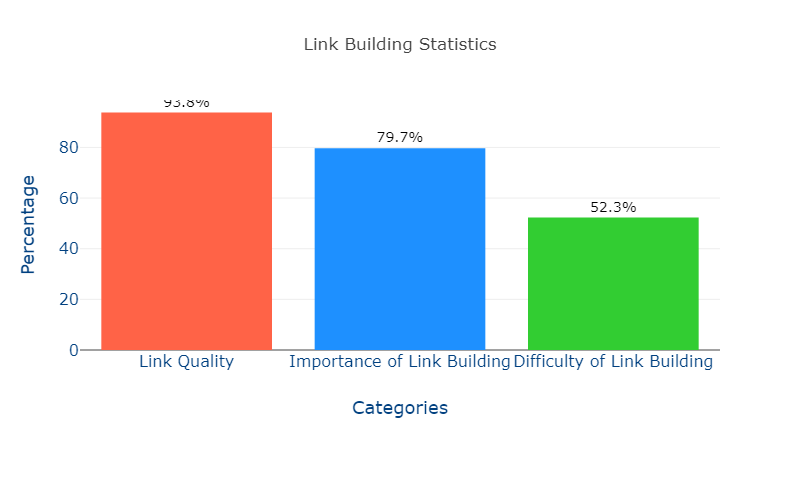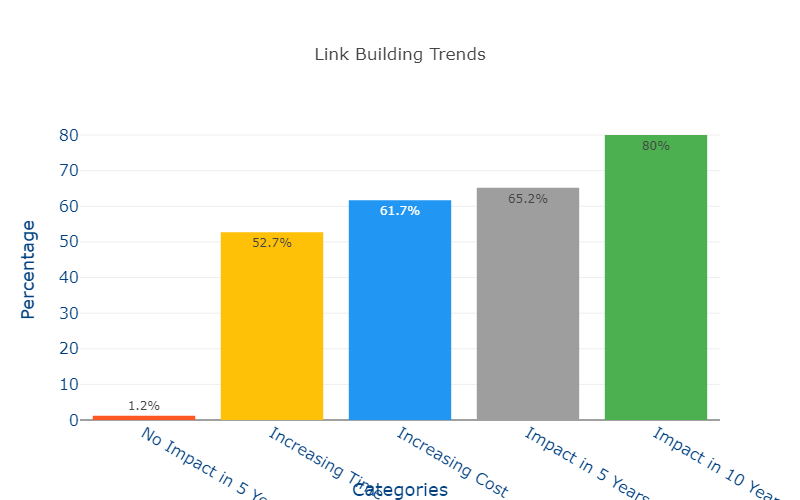Struggling to boost your website’s domain authority? This guide provides practical tips for building your DA and improving your site’s ranking on search engines.
Whether you’re a beginner or looking to enhance your existing knowledge, this guide will walk you through the process in simple, easy-to-follow steps.
Stay tuned to learn how to take your website to the next level and achieve higher domain authority.
Understanding Domain Authority and Its Significance
Explaining DA and How It’s Calculated
Domain Authority (DA) is a score from 0 to 100 that measures a website’s quality and authority. Backlinks, organic traffic, and spam factors are some factors that contribute to this score. Improving DA can improve a website’s SEO performance, even though it’s not a direct Google ranking factor. It’s important to differentiate between Moz Domain Authority and Google’s PageRank, as they focus on different metrics.
By acquiring high-quality backlinks, creating valuable content, and optimizing website structure, owners can boost their domain authority and SEO rankings.
Benchmarking: Identifying a Strong Domain Authority Score
A strong DA score can boost a website’s online presence. It improves search engine rankings and increases visibility and traffic. This enhances the site’s credibility and trustworthiness.
To achieve a strong domain authority score, it’s important to acquire high-quality backlinks, create link-worthy content, and optimize website structure and user experience.
Domain authority is a modern, holistic metric that reflects a website’s overall authority and potential ranking. In comparison, Google’s PageRank primarily focuses on link equity. Both metrics are crucial for assessing a website’s credibility and enhancing its search engine performance.
So, if you’re focusing on improving domain authority and meeting its benchmarks, websites will strengthen their online presence and reputation.
Moz Domain Authority vs. Google’s PageRank
Moz Domain Authority and Google’s PageRank are metrics that assess website performance and authority. Moz Domain Authority predicts ranking potential on a scale of 0-100, while Google’s PageRank measures page importance based on inbound links’ quality and quantity. Both consider backlinks, but Moz Domain Authority looks at organic traffic, spam factors, and link power, not directly in Google’s PageRank.
These metrics influence website search engine rankings. Higher scores mean better search result placement, indicating trustworthiness, reliability, and relevance, potentially attracting more organic traffic.
A high Moz Domain Authority score can offset a low Google PageRank, and vice versa. High scores in both are beneficial for overall search engine performance and ranking potential. Improving both Moz Domain Authority and Google’s PageRank maximizes a website’s search engine visibility and traffic potential.
Practical Steps to Enhance Your Domain Authority
Crafting Content That Attracts Quality Backlinks
Creating content that attracts quality backlinks involves making material that people want to share. This can be done by creating comprehensive articles, infographics, or videos that meet the audience’s needs. Also, reaching out to websites and industry leaders can lead to guest posting and collaboration opportunities. It’s important to review content to see what needs updating or removing, and to optimize it for keywords and better linking.
The Role of Share-Worthy Content in Link Building
So, creating share-worthy content is important for link-building and DA. Valuable and informative content attracts quality backlinks from authoritative sites. This can be achieved through unique, well-researched content that offers practical solutions. Strategies like infographics, original research, and in-depth articles contribute to crafting share-worthy content.
Promoting content on social media, reaching out to influencers, and guest posting can further enhance content sharing and secure backlinks. Consistently producing and promoting such content helps websites establish themselves as authoritative sources within their industries, boosting domain authority and search engine rankings.

Strategies for Guest Posting and Content Collaboration
One way to enhance domain authority is through guest posting and content collaboration. You can start by finding reputable websites in your industry or niche to contribute valuable content. Make sure your guest posts are well-written and offer insights to attract quality backlinks, which can increase your authority. Collaborating with other content creators to produce high-quality material can also improve the DA.
To find guest posting opportunities, research websites that align with your brand’s values and target audience, then reach out with proposals. These strategies can strengthen your backlink profile, enhance credibility, and influence within your industry while boosting domain authority and search engine rankings.
Conducting An Audit to Weed Out Detrimental Links
To conduct an audit for removing harmful links from a website, owners can start by using tools to assess their existing backlinks. They can then analyze the backlink profile for potentially toxic links.
Strategies for successful removal include reaching out to webmasters to request link removal and disavowing links if removal is not possible.
Optimizing website structure and user experience, as well as improving internal links, can positively impact search engine rankings.
Please, start following these steps and strategies, dear website owners can effectively remove harmful links and improve your domain authority for better search engine performance.
Optimizing Site Structure for a Seamless User Experience
To make a site easy to use, it’s important to have simple navigation and accessibility. Content should be organized logically and into categories, so users can find what they need. Clear menus and site maps can also help. It’s best to link relevant pages in a natural and user-friendly way when linking pages together. This helps users find more useful information. Managing internal links effectively improves site navigation, guiding visitors to related content and providing context.
My fellows! you need to place internal links strategically that can lead users through the site, keeping them engaged and reducing bounce rates.
Effective Internal Link Management for Enhanced Navigation
Internal link management is important for website navigation. When internal links are strategically placed within content, users can easily find related pages, creating a seamless browsing experience. This improves user engagement and reduces the bounce rate by encouraging visitors to explore more pages.
To create an effective internal linking framework, use descriptive anchor text, maintain a natural content flow, and prioritize high-value pages for internal linking. Website owners can optimize internal link management by conducting regular site audits, analyzing click-through rates and user behavior, and creating a clear site structure for easy navigation.
Additionally, ensuring that internal links are easily clickable and not buried within content contributes to a smooth user experience.
Core Principles of an Impactful Internal Linking Framework
An effective internal linking strategy, aligned with domain authority, signals to search engines the website’s authority and credibility. This can positively influence search engine rankings and organic traffic.
Focusing on the core principles of internal linking and incorporating them into a comprehensive SEO strategy can help website owners achieve DA and create a more compelling user experience.
Securing Listings in Industry-Relevant Directories
Securing listings in industry-relevant directories is a great way to boost domain authority. This is done by getting more backlinks and visibility online. To do this effectively, companies should pick directories that are specific to their industry, have high DA, and contain accurate information. These directories can bring in quality backlinks and drive relevant traffic to the company’s website.
Advanced Techniques for Building Domain Authority
Leveraging Public Relations to Gain Authority Backlinks
Public relations can help websites get good backlinks.
This means making friends with industry experts, journalists, and bloggers who can link to the website.
A website can get backlinks from top websites by offering great content or expertise.
Creating interesting press releases, doing industry research, and being in interviews or guest blog posts help get authority backlinks.
We can use analytics to see if the PR efforts are working. This means tracking how many backlinks are gained and their quality.
We can also follow website traffic and brand mentions to see how it affects the website’s authority.
So, by doing PR well and tracking it, websites can get great backlinks and make their authority score better.
Utilizing Analytics to Guide Domain Authority Improvement
Data analytics can help identify areas for improving domain authority. This involves analyzing key metrics like backlink quality, website traffic, and spam factors. Website owners can then focus on weak areas and prioritize improvement strategies.
Additionally, data analysis quantifies the impact of these strategies, helping owners see which tactics work and which need adjustment. Analytics can also track changes in key metrics over time to guide decision-making. By using data analytics, website owners can proactively boost their DA and improve their website’s ranking potential.
Engaging in Broken Link Building for Authority Gains
Engaging in broken link building can help a website gain authority. Website owners can identify broken links on reputable websites in the same niche. They can then replace these broken links with relevant, high-quality content from their site. This not only creates an opportunity to gain valuable backlinks but also establishes the website as a reliable source of information.
The process starts with thorough research to find broken links. After that, website owners need to create top-notch content to replace them. They also need to reach out to the website owners hosting the broken links and offer their content as a suitable replacement.
Potential risks and challenges include the time and effort needed for extensive research, reaching out to webmasters, and the possibility of rejection. However, these risks can be mitigated by focusing on creating quality content, building relationships with industry peers, and displaying professionalism and persistence in outreach efforts.
Executing a Content Audit for SEO and Authority Boost
When conducting a content audit for SEO and authority boost, it’s important to focus on key steps:
- Analyze existing content for relevance, quality, and performance.
- Identify underperforming pages that may be negatively impacting domain authority.
- Optimize content based on keyword research and on-page SEO best practices.
By conducting a content audit, website owners can:
- Identify and address areas for improvement in domain authority.
- Remove or update outdated content.
- Identify link-building opportunities.
- Improve overall content quality and user experience.
The best practices for using the results of a content audit to enhance SEO strategy and DA include:
- Using the data obtained to inform content creation and optimization efforts.
- Identifying link-building opportunities and strategies.
- Aligning content with audience needs and search intent.
Soon, the results of the content audit can guide website owners in prioritizing content updates and improvements to maximize the impact on DA and search engine rankings.
Using Domain Authority in Your SEO Strategy
Choosing Keywords Strategically Based on DA
Domain authority plays a significant role in guiding the strategic choice of keywords for SEO optimization. Websites with higher DA are more likely to rank well for competitive keywords. Factors to consider when choosing keywords strategically based on DA include the relevance of the keywords to the website’s niche, the search volume, and the keyword difficulty about the website’s DA.
Here, an understanding of domain authority can influence the prioritization of SEO tasks by focusing on acquiring high-quality backlinks, creating link-worthy content, and implementing on-page SEO best practices to improve DA. Now, if you prioritize these strategies, they will positively impact search engine rankings.
Prioritizing SEO Tasks with DA Insights
One way to improve SEO is by focusing on link building and content optimization. This can help enhance the website’s authority score. Tasks like acquiring high-quality backlinks and creating link-worthy content can have a big impact. It’s important to follow Google’s best practices to avoid penalties. Strategic keyword research based on authority insights can help target the right keywords.
If you’re using these insights dearest website owners, you can improve your domain authority and search engine rankings easily.

Guidelines on Staying Compliant with Google’s Best Practices
Staying compliant with Google’s SEO best practices and improving domain authority is important for a website. 3 Key factors for this are:
- Quality backlinks
- Organic traffic
- Trustworthy content
So, to develop DA, a website should focus on acquiring high-quality backlinks through link-worthy content. Auditing bad links is also crucial.
Optimizing content through keyword research and on-page SEO best practices can increase organic traffic, further improving your DA.
Comparing domain authority scores with competitors can provide valuable insights into overall performance, aiding compliance with Google’s best practices.
Task Automation Benefits
Resources for More Information:
- Backlinko: https://backlinko.com/
- Ahrefs: https://ahrefs.com/
- Moz: https://moz.com/
- SEMrush: https://www.semrush.com/
- Screaming Frog: https://www.screamingfrog.co.uk/seo-spider/
FAQs: Building DA
Domain authority is a measure of a website’s credibility and influence. It is important because it helps improve search engine rankings, which can increase organic traffic. High-domain authority sites like Google or Facebook can help improve your website’s credibility.
Some strategies for increasing domain authority include creating high-quality content, earning backlinks from reputable websites, and improving website SEO. For example, regularly publishing valuable blog posts and reaching out to industry influencers for backlinks can help boost domain authority.
It typically takes several months to start seeing an increase in domain authority. By consistently creating high-quality content, gaining backlinks from reputable sites, and improving website SEO, you can expect to see a gradual improvement in domain authority over time.
Yes, the quality of content on your site can affect domain authority. High-quality, relevant, and engaging content can improve your domain authority by attracting more backlinks and increasing user engagement. Conversely, low-quality or irrelevant content can harm your domain authority.
Yes, tools like Moz’s Link Explorer and Ahrefs’ Site Explorer can help track and improve domain authority by analyzing backlinks and providing recommendations for improvement. Additionally, creating high-quality content and earning quality backlinks can also help improve the domain authority.

Leave a Reply